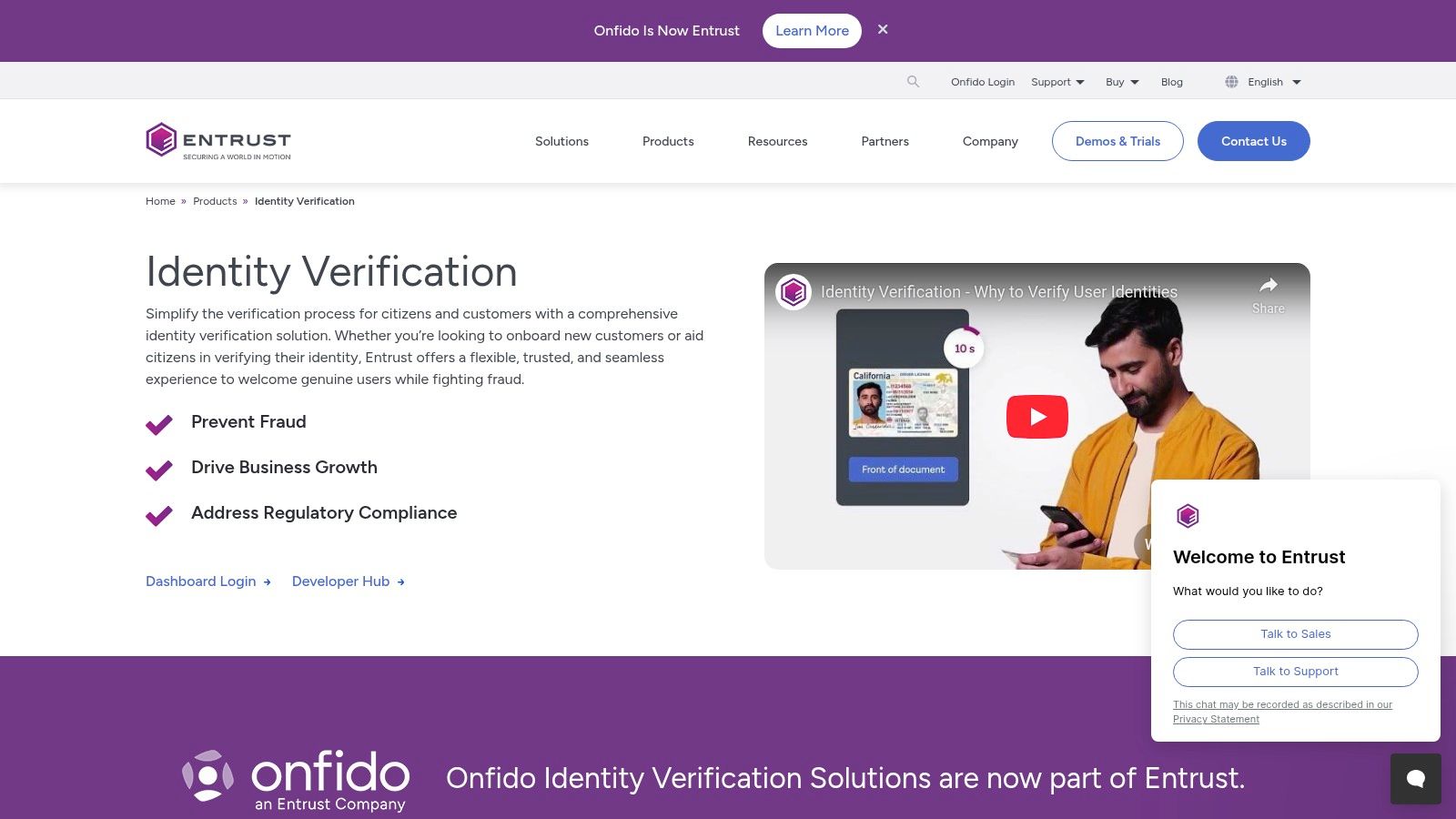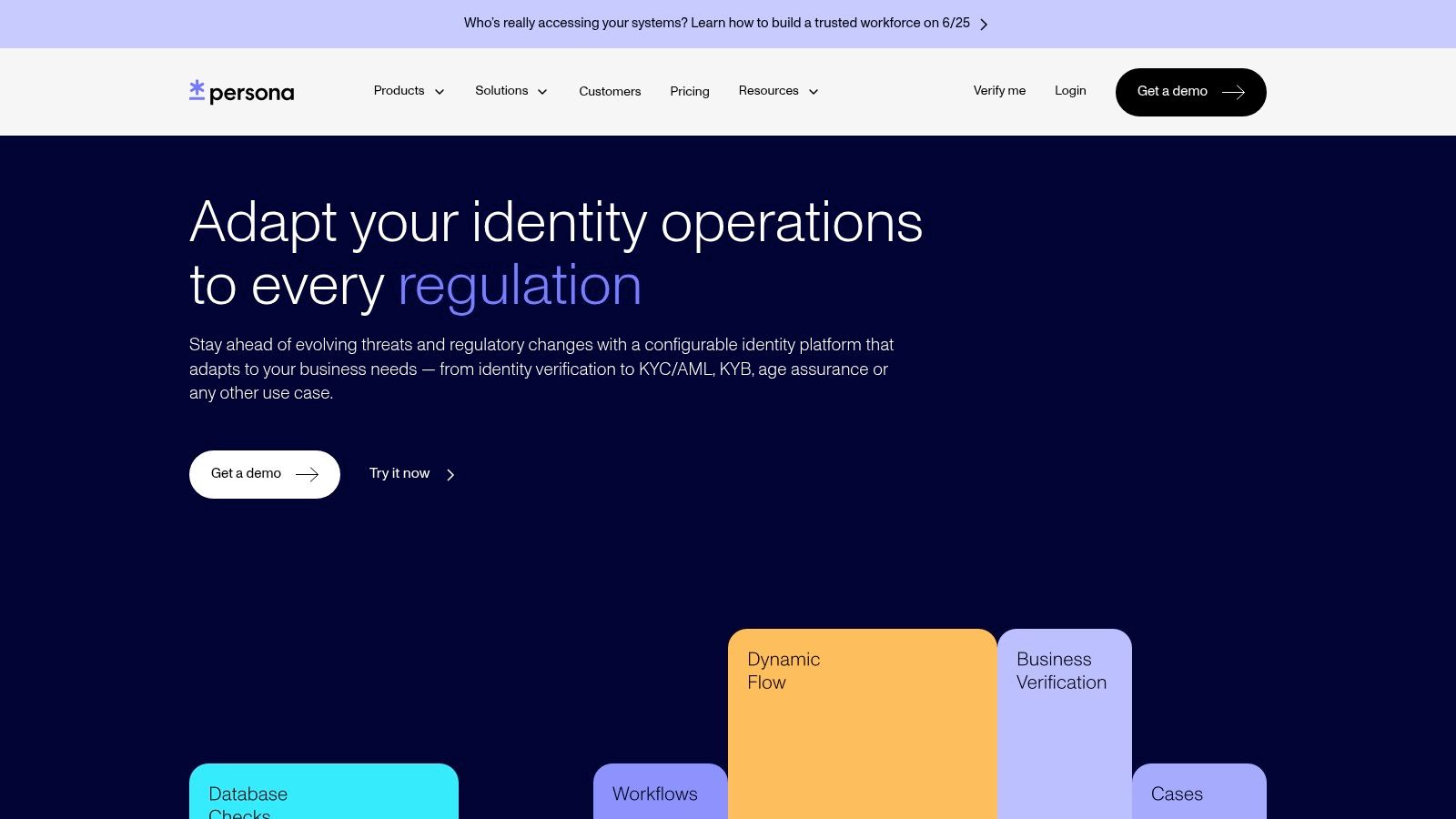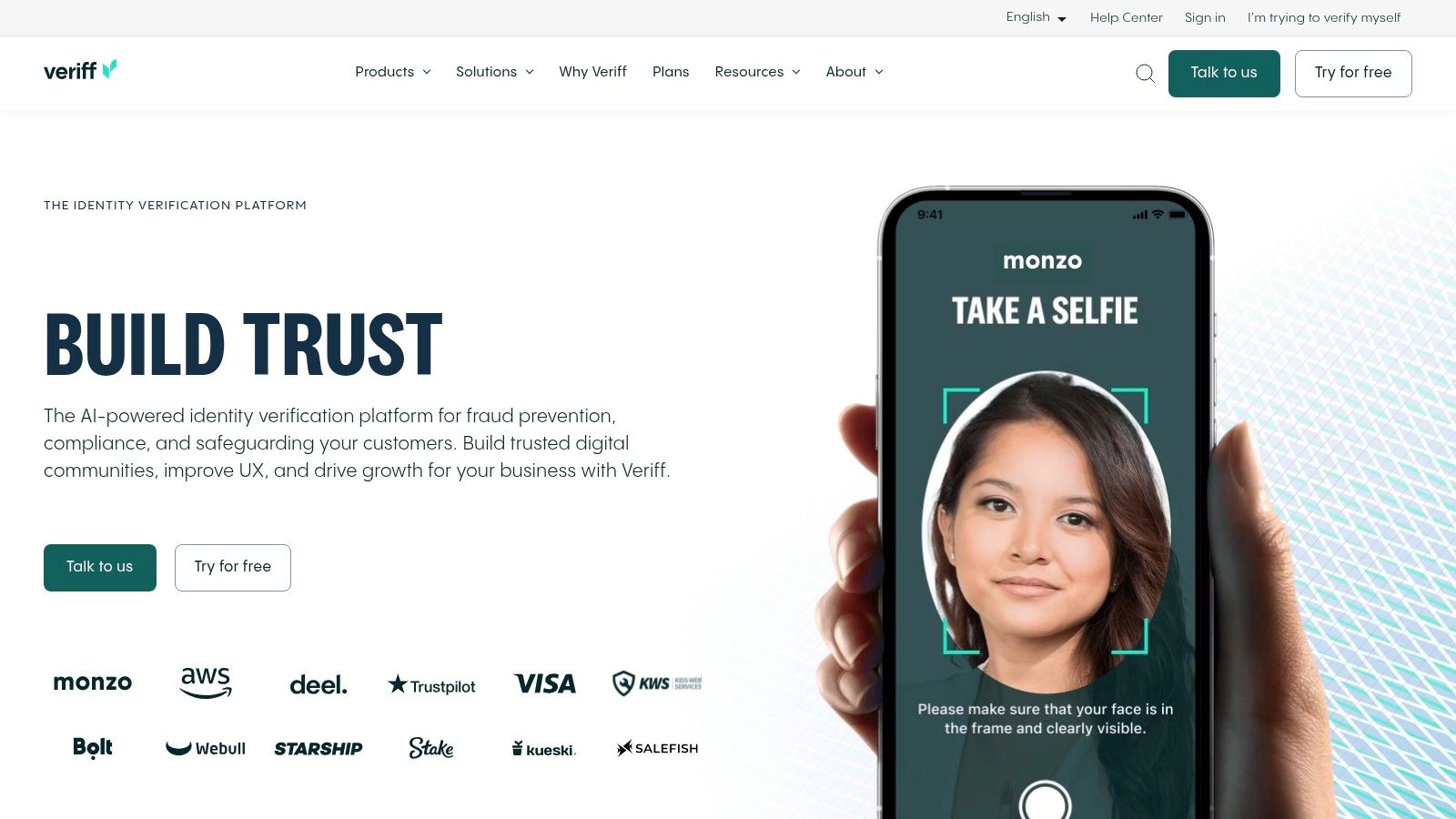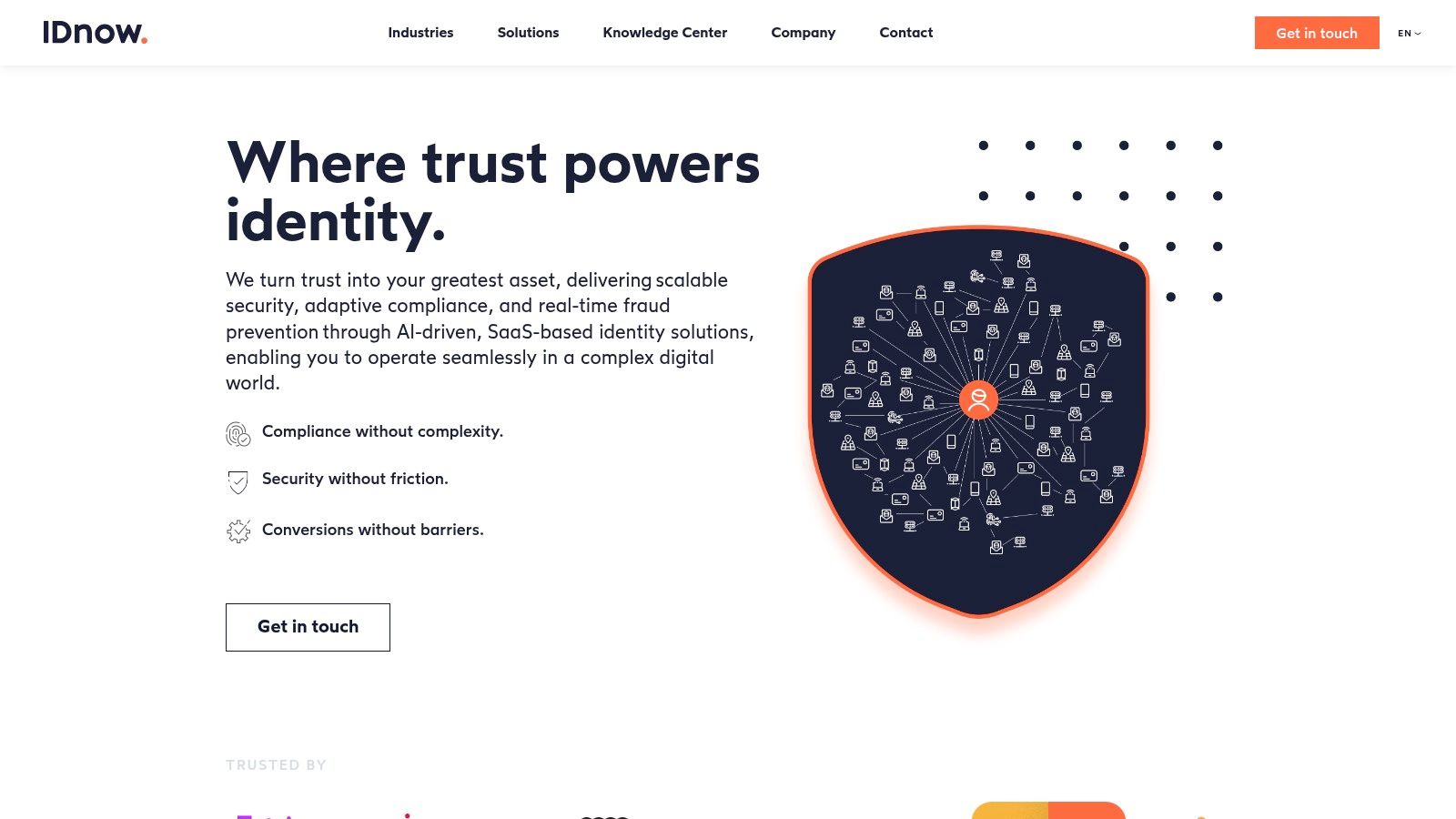Navigating the KYC Landscape: Why Verification Matters
KYC verification is critical for protecting your business from fraud and ensuring compliance. Choosing the right KYC verification tool can be difficult. This list of 7 leading KYC verification tools will help you streamline document collection, automate compliance, and strengthen your security. We’ll cover Jumio, Onfido, Sumsub, Shufti Pro, Persona, Veriff, and IDnow, so you can find the best fit for your needs.
1. Jumio
Jumio is a prominent player in the KYC verification tool landscape, offering a robust, AI-powered platform designed for end-to-end KYC and AML compliance. This sophisticated solution leverages advanced machine learning and biometric authentication to verify customer identities in real-time, making it a powerful tool for businesses navigating the complex world of digital identity verification. Its client base spans diverse sectors, including financial services, fintech, cryptocurrency, retail, the sharing economy, and online gaming, demonstrating its adaptability to various industry needs. For organizations seeking a comprehensive and reliable KYC verification solution, Jumio presents a compelling option. Its strength lies in its ability to automate and streamline the verification process while upholding high levels of accuracy and security. This makes it particularly well-suited for businesses operating in regulated industries or those dealing with sensitive customer data.

Jumio’s extensive feature set contributes significantly to its position as a leading KYC verification tool. Its AI-powered document verification supports an impressive 5,000+ ID document types from over 200 countries, enabling businesses to verify identities globally. The inclusion of biometric face matching and liveness detection adds another layer of security, effectively preventing spoofing attacks and ensuring the authenticity of the individual being verified. Furthermore, Jumio’s real-time risk scoring and fraud detection capabilities, coupled with customizable risk thresholds, allow businesses to tailor the verification process to their specific risk appetite. The platform also integrates AML screening against global watchlists and sanctions databases, assisting businesses in meeting regulatory requirements and mitigating financial crime risks. Finally, its mobile-first SDK integration with web fallback options ensures a seamless user experience across various devices.
For small and medium-sized businesses (SMBs), legal firms, HR agencies, real estate companies, mortgage brokers, transportation companies, immigration firms, and portfolio managers, Jumio offers a range of practical applications. SMBs can leverage Jumio to onboard customers quickly and securely, reducing manual verification processes and improving operational efficiency. Legal firms can ensure compliance with KYC/AML regulations when onboarding new clients, protecting themselves from potential legal repercussions. HR and staffing agencies benefit from streamlined candidate onboarding and verification, ensuring they hire legitimate individuals. Real estate agencies can efficiently process tenant applications, while mortgage brokers and financial services professionals can automate loan paperwork, reducing processing time and improving customer experience. Transportation companies can collect and verify driver and vehicle documents, ensuring regulatory compliance. Immigration firms can streamline visa applications by efficiently collecting and verifying applicant data. Portfolio managers can utilize Jumio for investor onboarding and ongoing due diligence.
While Jumio offers a powerful KYC solution, potential users should be aware of its premium pricing structure, which might be a barrier for smaller businesses with limited budgets. Implementing the platform can also be complex for basic use cases, potentially requiring dedicated technical resources. Some users have reported occasional false positives during the verification process, which, while not necessarily a deal-breaker, requires businesses to have a process in place to handle such occurrences. Unfortunately, specific pricing details and technical requirements are not readily available on their website, necessitating direct contact with Jumio for a tailored quote and implementation guidance.
Compared to other KYC verification tools, Jumio stands out with its comprehensive global coverage and robust fraud detection capabilities. However, businesses with simpler KYC needs might find alternative solutions that offer a more streamlined and cost-effective approach.
For businesses considering Jumio, it is recommended to thoroughly evaluate their specific KYC requirements and compare Jumio’s features and pricing against other available options. A pilot implementation can also be beneficial to assess the platform’s performance and integration within their existing workflows. Contacting Jumio directly is crucial for obtaining accurate pricing information, understanding technical requirements, and receiving personalized implementation support. You can explore their platform and its functionalities further by visiting their website at https://www.jumio.com.
2. Onfido
Onfido is a leading KYC verification tool that leverages artificial intelligence (AI) and machine learning to streamline the identity verification process for businesses. This powerful platform offers a comprehensive solution by combining document verification, biometric checks, and background screenings, making it a trusted choice for over 1,500 businesses worldwide, including prominent names like Zipcar, Revolut, and Deliveroo. This robust approach allows businesses to confidently verify their customers’ identities while mitigating fraud and ensuring compliance with KYC/AML regulations. For businesses operating in regulated industries, Onfido provides the necessary tools to meet stringent compliance requirements and build trust with their customers.

Onfido’s versatility makes it an ideal KYC verification tool for a broad range of industries and use cases. Small and medium-sized businesses can benefit from its streamlined document collection capabilities, while legal firms can leverage its secure platform for client document management and compliance. HR and staffing agencies can expedite candidate onboarding and verification processes, and real estate agencies can efficiently process property documents and tenant applications. The platform is also valuable for mortgage brokers, financial services professionals, transportation companies managing driver and vehicle documents, and even immigration firms processing visa applications. Portfolio managers can also use Onfido to ensure compliance and manage investor identities securely. You can learn more about Onfido and its broad applications for various sectors.
One of Onfido’s key strengths is its extensive document verification capabilities. Supporting over 2,500 document types from more than 195 countries, it provides a truly global solution. This feature is particularly beneficial for businesses with international customers or those operating in diverse markets. The facial biometric verification, incorporating both passive and active liveness detection, adds an extra layer of security, ensuring that the person presenting the document is indeed the legitimate holder. Onfido’s use of computer vision and AI for identity document authenticity checks helps detect fraudulent documents, further enhancing the reliability of the verification process. For those needing deeper insights, background screening and enhanced due diligence services are also available, making Onfido a comprehensive solution for KYC compliance.
From a technical perspective, Onfido offers a user-friendly interface designed to provide a smooth customer experience. The strong API documentation and developer tools enable seamless integration with existing systems, minimizing disruption to established workflows. The platform also offers flexible pricing models, including pay-per-check options, allowing businesses to scale their usage based on their needs. Onfido also provides excellent customer support and implementation assistance, ensuring a smooth onboarding process. While specific pricing details are not readily available and might require contacting their sales team, the pay-per-check option offers flexibility for businesses of all sizes.
While Onfido excels in many areas, it’s important to be aware of some potential limitations. Customization options for verification workflows might be somewhat restricted. Furthermore, premium features and enterprise plans may come at a higher price point. Some integration complexity might also be encountered by non-technical users, potentially necessitating developer assistance. However, the comprehensive features, strong security measures, and global coverage offered by Onfido make it a strong contender for businesses looking for a robust KYC verification tool. Its ability to automate workflows and perform various checks makes it a highly efficient solution for managing KYC/AML compliance. If your business requires a comprehensive and reliable KYC solution, Onfido is certainly worth considering.
3. Sumsub: A Comprehensive KYC Verification Tool
Sumsub stands out as a robust and versatile KYC verification tool, offering a comprehensive suite of identity verification and compliance solutions. It’s more than just a simple KYC check; it provides a full-cycle approach covering Know Your Customer (KYC), Know Your Business (KYB), and Anti-Money Laundering (AML) requirements. This makes it a powerful ally for businesses navigating the complex world of regulatory compliance, particularly in high-risk sectors like fintech and cryptocurrency. For businesses looking for a one-stop-shop solution for all their verification needs, Sumsub is definitely worth considering.
Key Features and Practical Applications:
Sumsub’s multi-layered approach to identity verification makes it suitable for a wide range of applications. Here’s a breakdown of its core features and how they translate to real-world use cases:
Multi-Layered Identity Verification: This includes document verification (passport, driver’s license, ID card), selfie verification (liveness detection), and even video verification for enhanced security. This is invaluable for businesses onboarding customers remotely, such as online banks, cryptocurrency exchanges, and online gaming platforms. Imagine a small business offering online courses – Sumsub can help verify the identity of participants, ensuring compliance and preventing fraud.
Business Verification (KYB): Sumsub goes beyond individual verification with its KYB functionality. This involves company registry checks and Ultimate Beneficial Owner (UBO) identification, crucial for complying with AML regulations. This feature is especially beneficial for legal firms conducting due diligence on clients, financial institutions onboarding corporate accounts, or real estate agencies verifying the legitimacy of businesses involved in property transactions.
Ongoing Transaction Monitoring and AML Screening: Sumsub offers continuous monitoring of transactions and screens against global AML watchlists, enabling businesses to detect and prevent suspicious activity. This is critical for fintech companies, payment processors, and any business handling significant financial transactions. For example, a portfolio manager can leverage this feature to ensure compliance and protect their clients’ investments.
Customizable Verification Scenarios and Risk-Based Authentication: This allows businesses to tailor the verification process based on their specific risk appetite and industry requirements. For instance, a mortgage broker might implement stricter verification measures for high-value loans compared to smaller loan applications. Similarly, immigration firms can configure specific checks for different visa categories, streamlining the application process.
White-Label Solutions with Full UI Customization: Sumsub allows businesses to integrate the verification process seamlessly into their existing platforms with full branding control. This provides a cohesive user experience and reinforces brand identity. This is highly beneficial for HR and staffing agencies who want a branded candidate onboarding portal or transportation companies integrating driver document verification into their internal systems.
Pros and Cons for Businesses:
Pros: Sumsub’s comprehensive, all-in-one approach simplifies compliance management. Its competitive pricing with a transparent fee structure makes it accessible to businesses of all sizes. The strong focus on the cryptocurrency and fintech sectors is a significant advantage for businesses operating in these rapidly evolving industries. The extensive customization and white-labeling options provide flexibility and control over the user experience.
Cons: The interface, while powerful, can be initially complex for first-time users. Limited offline verification capabilities might be a drawback for businesses requiring in-person verification. While Sumsub’s documentation is generally good, it could be more comprehensive for advanced features, potentially requiring some initial learning curve.
Implementation and Setup:
While specific technical requirements are best found on Sumsub’s website (https://sumsub.com), the integration process generally involves API integration and UI customization. Sumsub provides support and documentation to guide businesses through the implementation process.
Comparison with Similar Tools:
While other KYC verification tools exist, Sumsub differentiates itself with its comprehensive coverage of KYC, KYB, and AML, combined with its robust customization options. Its focus on high-risk industries, like cryptocurrency, makes it a strong contender for businesses operating in these sectors.
Pricing:
Sumsub offers a tiered pricing structure based on usage and features. Details on specific pricing plans are available on their website.
Sumsub provides a powerful KYC verification tool for businesses of all sizes. Its comprehensive features, combined with flexible customization options, make it a valuable asset for companies seeking streamlined compliance and a secure onboarding process. From small businesses offering online services to large financial institutions, Sumsub offers a scalable solution to navigate the ever-evolving landscape of identity verification and regulatory compliance.
4. Shufti Pro
Shufti Pro stands out as a robust KYC verification tool powered by artificial intelligence, offering real-time KYC, AML, and identity verification solutions. It’s a versatile platform catering to diverse business needs with both automated and hybrid verification methods. This blend of AI and human expertise ensures high accuracy rates, a critical aspect of KYC compliance. Shufti Pro’s extensive global reach is also noteworthy, supporting businesses across over 240 countries and territories with verification capabilities in more than 150 languages. This makes it a powerful solution for businesses operating in diverse and international markets. Its ability to efficiently verify identities across different geographical regions and languages makes it a valuable asset for companies looking to streamline their KYC processes globally.

Shufti Pro offers a multi-step verification process, encompassing document verification, face verification, address verification, and consent verification. This comprehensive approach strengthens security and reduces the risk of fraudulent activities. Real-time AML screening against global sanctions and PEP (Politically Exposed Persons) databases adds another layer of protection, helping businesses comply with regulatory requirements. The inclusion of Video KYC capabilities also allows for enhanced customer interaction and provides a more dynamic verification experience. Furthermore, the platform boasts advanced OCR technology that supports over 3,000 identity documents globally, further demonstrating its adaptability and global applicability.
For businesses handling sensitive client information, like legal firms or mortgage brokers, Shufti Pro’s robust features offer peace of mind. The platform helps maintain regulatory compliance, particularly for businesses in highly regulated industries like financial services. The multi-layered approach from document verification to AML screening ensures a thorough and accurate verification process, crucial for mitigating risks associated with fraud and identity theft. Imagine a mortgage broker needing to quickly and securely verify a client’s identity. Shufti Pro’s automated system can significantly speed up the process while maintaining rigorous compliance standards. Similarly, transportation companies can leverage Shufti Pro during driver onboarding, ensuring all necessary documents are valid and compliant. Immigration firms facing the complex challenge of verifying visa applicant data will also find its multi-language support and global document coverage incredibly beneficial.
Shufti Pro’s pricing starts from $0.30 per verification, making it a cost-effective solution for businesses, especially smaller businesses or startups seeking efficient KYC verification tools. While the pricing appears competitive, it’s crucial to understand the specifics of the pricing tiers and how they relate to the various features offered. This transparent pricing structure, combined with a user-friendly verification process, contributes to high conversion rates. Learn more about Shufti Pro to gain a deeper understanding of how document collection software streamlines processes. This is particularly relevant in the context of KYC verification, as efficient document collection plays a pivotal role in the overall process.
While Shufti Pro offers numerous advantages, it’s essential to be aware of potential drawbacks. Processing times can vary between automated and manual reviews, which might impact efficiency for time-sensitive applications. Also, some users have reported inconsistencies in verification quality, highlighting the need for consistent monitoring and quality control. Furthermore, the platform’s analytics and reporting features are somewhat limited compared to some competitors, potentially hindering in-depth data analysis for optimizing KYC processes.
Implementing Shufti Pro is generally straightforward. The platform offers APIs and SDKs for seamless integration with existing systems, simplifying the setup process for businesses. However, technical requirements may vary depending on the specific integration needs and the complexity of the existing infrastructure. Consulting the platform’s documentation or contacting their dedicated customer support team can be beneficial during implementation. They offer 24/7 support with dedicated account managers to assist businesses with any technical or operational challenges. This readily available support is particularly valuable during the initial setup and ongoing usage of the platform.
5. Persona
Persona stands out as a highly customizable KYC verification tool, offering businesses a flexible identity infrastructure to manage the entire customer lifecycle. Unlike some one-size-fits-all solutions, Persona allows you to tailor verification workflows to your precise needs and risk appetite. This granular control makes it a particularly attractive option for businesses operating in regulated industries or facing unique compliance challenges. Whether you’re a fintech startup, a healthcare provider, an online marketplace, or even a Web3 platform, Persona can adapt to your specific requirements. This adaptability ensures you’re collecting only the necessary information, streamlining the user experience, and minimizing friction during onboarding. Its focus on building a robust and adaptable KYC process makes it a valuable tool for businesses seeking long-term scalability and security.

One of Persona’s key strengths lies in its flexible identity infrastructure, powered by a drag-and-drop workflow builder. This intuitive interface allows you to create custom KYC verification flows without requiring any coding knowledge. You can easily integrate various verification methods, including document verification (supporting over 1,000 document types from 200+ countries), government ID verification with real-time database checks, and dynamic verification flows that adapt based on risk signals and user behavior. For example, a mortgage broker could create a workflow specifically for loan applications, integrating credit checks and income verification alongside standard KYC procedures. Similarly, a transportation company onboarding new drivers can automate the collection and verification of driver’s licenses and vehicle registration documents.
Persona’s focus extends beyond initial verification to ongoing identity management. The platform provides a dedicated dashboard for monitoring user identities, managing cases, and ensuring ongoing compliance. This feature is particularly valuable for businesses dealing with sensitive data or operating in heavily regulated environments. Legal firms, for instance, can leverage Persona for secure client document management and compliance, while HR and staffing agencies can streamline candidate onboarding and verification. Real estate agencies, too, can benefit from automated processing of property documents and tenant applications, significantly reducing manual effort and ensuring compliance.
While Persona offers significant advantages, it’s important to consider its potential drawbacks. As a relatively newer player in the KYC verification space, Persona has a smaller market presence compared to some established competitors. This translates to a potentially smaller community for support and fewer third-party integrations. Additionally, while the drag-and-drop interface simplifies basic customization, mastering the more advanced features may involve a steeper learning curve.
While specific pricing information isn’t readily available on their website, Persona offers transparent pricing with detailed cost breakdowns, allowing businesses to understand the cost implications of their chosen verification flows. This transparency is crucial for budgeting and allows for better cost control as your business scales.
For businesses considering Persona, it’s advisable to leverage the available resources on their website, including documentation and potentially a free trial or demo. This hands-on experience will allow you to evaluate the platform’s suitability for your specific KYC verification needs. Consider testing different workflows and exploring the customization options to ensure it aligns with your long-term compliance and operational requirements. You can learn more and explore the platform at https://withpersona.com.
In summary, Persona earns its place on this list due to its unparalleled flexibility and customization options. Its focus on user experience, combined with its robust identity management features, makes it a strong contender for businesses seeking a KYC verification tool that can adapt and scale alongside their evolving needs. While the smaller market presence and potentially steeper learning curve for advanced features are factors to consider, Persona’s strengths in customization and user experience make it a valuable tool for a wide range of businesses, from small startups to established enterprises.
6. Veriff
Veriff stands out as a powerful KYC verification tool leveraging AI and machine learning to provide robust and efficient identity verification services. This makes it an excellent choice for businesses needing a fast, accurate, and secure solution. It analyzes thousands of technological and behavioral variables in real-time, ensuring high accuracy rates and minimizing fraudulent activities. With support for customers from over 190 countries and service to over 1,000 companies globally, Veriff offers a comprehensive solution for businesses operating internationally. Its focus on user experience optimization leads to high conversion rates, meaning fewer abandoned applications and a smoother onboarding process for your clients.

One of Veriff’s key strengths is its speed. Its real-time decision engine processes verifications in under six seconds, significantly streamlining the KYC process. This rapid processing, combined with advanced liveness detection during biometric authentication, makes Veriff an ideal KYC verification tool for businesses prioritizing efficiency. Think of the impact on your customer onboarding – a quick and seamless verification process leaves a positive first impression and reduces the chance of potential clients dropping off due to lengthy procedures. For time-sensitive industries like financial services, where rapid loan approvals are crucial, Veriff’s speed can be a significant competitive advantage.
Veriff offers a suite of features tailored to various KYC needs. From AI-powered identity verification boasting 99%+ accuracy rates to video verification capabilities for enhanced security, Veriff equips businesses with the tools they need to combat fraud and ensure compliance. Furthermore, its compliance management tools cater to multiple regulatory frameworks, making it a suitable solution for businesses operating in different jurisdictions. Whether you’re a mortgage broker dealing with strict financial regulations or an immigration firm navigating complex visa requirements, Veriff can adapt to your specific needs.
The platform is particularly well-suited for businesses with a global clientele, given its extensive coverage of countries and document types. For companies operating in multiple regions, this eliminates the need for multiple KYC providers, simplifying operations and reducing administrative overhead. Imagine a portfolio manager with international clients; Veriff allows them to onboard clients from diverse locations seamlessly, all within a single platform.
While Veriff offers substantial advantages, it’s essential to consider its potential drawbacks. The premium pricing structure might pose a challenge for budget-conscious smaller businesses. Also, while Veriff excels in core KYC functionality, it offers limited customization options for verification interfaces, which might not be ideal for businesses requiring highly tailored solutions. Finally, while Veriff supports a wide range of document types, it might not cover all documents compared to some competitors. This is something to consider depending on the specific requirements of your industry and client base.
For practical implementation, Veriff offers various integration options, making it relatively straightforward to embed into existing systems. While specific technical requirements can vary depending on the integration method, Veriff provides detailed documentation and support to assist businesses through the process. Consider a scenario where an HR agency needs to streamline its candidate onboarding process; Veriff can be integrated with their existing HR software to automate background checks and identity verification, saving time and resources.
Compared to similar tools, Veriff stands out with its speed and user experience focus. While other tools may offer more extensive document coverage or customization options, Veriff’s emphasis on speed and ease of use makes it a strong contender for businesses prioritizing a streamlined and efficient KYC process. If client onboarding speed and a positive user experience are top priorities, Veriff deserves serious consideration. Learn more about Veriff and its potential benefits for your onboarding process. Veriff’s robust security features and global reach position it as a valuable KYC verification tool for businesses of all sizes, especially those operating in a fast-paced, international environment. Visit the Veriff website for more detailed information and to explore their solutions.
7. IDnow: Robust KYC and AML Compliance for Regulated Industries
IDnow stands out as a powerful KYC verification tool specifically designed for businesses operating in regulated industries, particularly within Europe. Its emphasis on European compliance requirements, coupled with a suite of verification methods and robust security features, makes it a compelling choice for companies prioritizing stringent data privacy and regulatory adherence. This platform excels in streamlining the onboarding process while ensuring compliance with regulations like GDPR, PSD2, and eIDAS. Whether you’re a fintech startup navigating complex financial regulations or a telecommunications company dealing with sensitive customer data, IDnow offers a comprehensive solution tailored to your needs.

IDnow offers a range of verification methods catering to diverse business needs. Its automated AI-powered solution, AutoIdent, utilizes machine learning to analyze identity documents and perform biometric checks, providing a quick and efficient way to verify users. For scenarios requiring a higher level of assurance, VideoIdent facilitates real-time video calls with trained agents who verify identity documents and conduct liveness checks. Furthermore, its eSign solution enables legally binding qualified electronic signatures (QES) within the EU, simplifying document signing and workflow automation. This flexibility allows businesses to choose the verification method that best suits their specific risk profile and customer experience objectives. For example, a mortgage broker might leverage VideoIdent for high-value transactions requiring enhanced security, while a sharing economy platform could opt for the automated AutoIdent to streamline user onboarding.
IDnow’s focus on European regulatory compliance is a key differentiator. It ensures that businesses can confidently navigate the complexities of GDPR, PSD2, eIDAS, and other relevant regulations. This is particularly beneficial for businesses operating in the European market or dealing with European customers. The platform provides detailed compliance documentation and audit trails, simplifying audits and demonstrating regulatory adherence. This makes it an ideal KYC verification tool for legal firms requiring secure client document management and compliance, as well as immigration firms handling sensitive visa applicant data.
From a security perspective, IDnow adheres to stringent industry standards, boasting ISO 27001 and SOC2 certifications. This bank-grade security infrastructure provides peace of mind, especially for businesses handling sensitive financial data, such as banking and fintech companies. The platform also offers human oversight options alongside its AI-powered verification, adding an extra layer of security and accuracy. This is particularly valuable for HR and staffing agencies managing candidate onboarding and verification, ensuring the integrity of the hiring process.
While IDnow offers compelling features and robust security, it’s essential to consider its potential drawbacks. Compared to some competitors, particularly those not specializing in European compliance, IDnow’s pricing may be higher. Additionally, its global coverage is primarily concentrated within Europe, which may be a limitation for businesses operating in other regions. The setup process for advanced compliance features can also be complex, potentially requiring technical expertise. However, for businesses operating within regulated European industries, the comprehensive compliance and security features offered by IDnow often outweigh these considerations.
Implementing IDnow involves integrating its API or SDK into your existing systems. While documentation and support resources are available, businesses should anticipate some technical integration effort. For those requiring advanced compliance configurations, engaging with IDnow’s support team is recommended for a seamless setup. Specific pricing information is generally tailored to individual business needs and requires contacting IDnow directly. Overall, IDnow is a robust KYC verification tool well-suited for businesses requiring stringent compliance within regulated industries, especially in the European market. Its multi-method verification, strong security features, and focus on regulatory adherence provide a valuable solution for a variety of use cases, from streamlining user onboarding to ensuring secure document management.
KYC Tool Feature Comparison
| Solution | Core Features/Capabilities ✨ | User Experience & Quality ★★★★☆ | Value & Pricing 💰 | Target Audience 👥 | Unique Selling Points 🏆 |
|---|---|---|---|---|---|
| Jumio | AI-powered doc verification, biometric face match | High accuracy, strong fraud detection | Premium pricing 💰💰 | Fintech, financial services, retail | Global coverage 5,000+ ID types, AML screening |
| Onfido | Doc & biometric verification, background checks | User-friendly, smooth UX | Flexible pricing, pay-per-check 💰 | SMBs to enterprises in tech, transport, fintech | Easy integration, strong API support |
| Sumsub | Full KYC/KYB/AML, video verification, white-label | Comprehensive but complex UI | Competitive & transparent 💰 | Fintech, crypto, gaming | All-in-one compliance, strong customization |
| Shufti Pro | Hybrid AI + human review, multi-step verification | User-friendly, high conversion | Low starting price 💰 | Global, multilingual businesses | Video KYC, 24/7 support, 150+ languages |
| Persona | Flexible workflow builder, dynamic risk-based flows | Modern UI, highly customizable | Transparent pricing 💰 | Fintech, healthcare, marketplaces, Web3 | No-code customization, identity management dash |
| Veriff | AI with 99%+ accuracy, fast real-time decisions | Fast processing, high conversion | Premium pricing 💰💰 | Global enterprises needing fast verifications | <6 sec verification, advanced fraud detection |
| IDnow | Multi-method (AI, video, eSign), European focused | Strong compliance, secure but complex setup | Higher pricing 💰💰 | Regulated European industries | Bank-grade security, QES eSign legally binding |
Choosing the Right KYC Verification Tool for Your Needs
Selecting the right KYC verification tool can feel overwhelming with so many options available. From Jumio and Onfido to Sumsub, Shufti Pro, Persona, Veriff, and IDnow, each KYC verification tool offers a unique set of features catering to different needs and budgets. This article has highlighted some of the leading solutions, exploring their strengths and weaknesses to help you navigate the decision-making process. Remember, the most important takeaways when choosing a KYC verification tool are to carefully consider your specific requirements, including the types of documents you need to verify, the geographic locations you operate in, and your budget. Factors such as integration capabilities, security measures, and scalability are also crucial for long-term success. For industries ranging from legal and financial services to HR, real estate, and transportation, the right KYC verification tool is essential for compliance, security, and streamlined operations. Implementing these tools effectively requires careful planning and integration with existing systems.
Choosing and implementing a KYC verification tool is just one part of the broader document management process. For a truly seamless and efficient workflow, consider platforms like Superdocu to streamline your document collection and management. Superdocu integrates with various KYC solutions, providing a central hub for all your document needs and enhancing the overall customer experience. Ready to optimize your document workflow and complement your chosen KYC verification tool? Visit Superdocu today to learn more.
